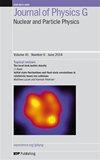在格子QCD中寻找Δ(1232)的第一次径向激发
IF 3.5
3区 物理与天体物理
Q2 PHYSICS, NUCLEAR
Journal of Physics G: Nuclear and Particle Physics
Pub Date : 2024-05-06
DOI:10.1088/1361-6471/ad33e2
引用次数: 0
摘要
我们对Δ重子谱进行了格子QCD分析,目的是找到Δ(1232)基态的2s径向激发态的位置。利用相关矩阵分析中的抹黑三夸克算子,我们报告了 JP = 3/2+ 光谱中基态、第一激发态和第二激发态在宽范围内的质量。 我们确定最低的基态为 1s 态,这与众所周知的 Δ(1232) 相符。第一个激发被确定为 2s 态,但在我们的 ∼3 fm 晶格上发现其质量约为 2.15 GeV,这似乎与 Δ(1600) 共振没有显著关联。我们还报告了通过我们的方法可以获得的自旋-1/2 和奇偶态。径向激发的巨大激发能量为解决长期以来的重子共振缺失问题提供了可能。本文章由计算机程序翻译,如有差异,请以英文原文为准。
Searching for the first radial excitation of the Δ(1232) in lattice QCD
We present a lattice QCD analysis of the Δ-baryon spectrum, with the goal of finding the position of the 2s radial excitation of the Δ(1232) ground state. Using smeared three-quark operators in a correlation matrix analysis, we report masses for the ground, first and second excited states of the JP = 3/2+ spectrum across a broad range of . We identify the lowest lying state as being a 1s state, consistent with the well known Δ(1232). The first excitation is identified as a 2s state, but is found to have a mass of approximately 2.15 GeV on our ∼3 fm lattice, which does not appear to be associated with the Δ(1600) resonance in a significant manner. We also report on the spin-1/2 and odd-parity states accessible via our methods. The large excitation energies of the radial excitations provide a potential resolution to the long-standing missing baryon resonances problem.
求助全文
通过发布文献求助,成功后即可免费获取论文全文。
去求助
来源期刊
CiteScore
7.60
自引率
5.70%
发文量
105
审稿时长
1 months
期刊介绍:
Journal of Physics G: Nuclear and Particle Physics (JPhysG) publishes articles on theoretical and experimental topics in all areas of nuclear and particle physics, including nuclear and particle astrophysics. The journal welcomes submissions from any interface area between these fields.
All aspects of fundamental nuclear physics research, including:
nuclear forces and few-body systems;
nuclear structure and nuclear reactions;
rare decays and fundamental symmetries;
hadronic physics, lattice QCD;
heavy-ion physics;
hot and dense matter, QCD phase diagram.
All aspects of elementary particle physics research, including:
high-energy particle physics;
neutrino physics;
phenomenology and theory;
beyond standard model physics;
electroweak interactions;
fundamental symmetries.
All aspects of nuclear and particle astrophysics including:
nuclear physics of stars and stellar explosions;
nucleosynthesis;
nuclear equation of state;
astrophysical neutrino physics;
cosmic rays;
dark matter.
JPhysG publishes a variety of article types for the community. As well as high-quality research papers, this includes our prestigious topical review series, focus issues, and the rapid publication of letters.

 求助内容:
求助内容: 应助结果提醒方式:
应助结果提醒方式:


